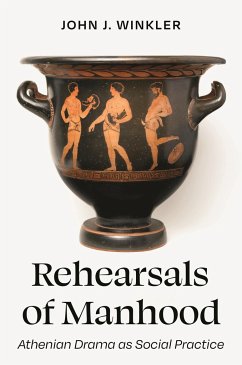"When John J. Winkler died in 1990, he left a substantially complete manuscript containing the final version of the project he had undertaken in the last decade of his life: an original interpretation of the development and meaning of ancient Greek drama. That manuscript was based on The Martin Classical Lectures at Oberlin College, which Winkler delivered in September of 1988. The present text has been edited and updated by classicists David Halperin, Winkler's literary executor, and Kirk Ormand, Winkler's student and an expert on Greek drama. Rehearsals of Manhood, the final work of a widely recognized and celebrated classical scholar, proposes an entirely new account of Greek drama providing an explanation of the social place of Greek drama and its relation to the gendered organization of Athenian social life. Winkler interprets drama as a secular manhood ritual, a public aesthetic undertaking focused on the initiation of boys into manhood and, specifically, on the training, the display, and the representation of young male warriors. According to Winkler, the chorus of both tragedy and comedy was composed of young Athenian men of citizen status, about eighteen to twenty years of age, who were undergoing military training in order to prepare themselves for the task of warfare; they danced on a rectangular dance floor in a rectangular formation that recalled the arrangement of the infantry phalanx; they accompanied plays that often highlighted scenarios of risk faced by young men on the verge of adulthood; and they performed in a theater whose seating was arranged to display the corporate body of the male citizenry as a whole, both its democratic equality and its hierarchical ranking according to degrees of excellence. Winkler does not offer new interpretations of the texts of Greek plays but a new account of how the very practice of dramatic performance fit into the social life and gender politics of the Athenian state"--








